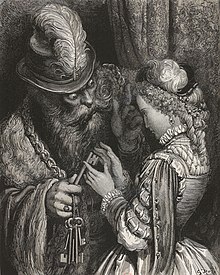| Bluebeard's Castle | |
|---|---|
| Opera by Béla Bartók | |
 Bluebeard and his wife in an illustration by Gustave Doré for Perrault's tale | |
| Native title | Hungarian: A kékszakállú herceg vára |
| Librettist | Béla Balázs |
| Language | Hungarian |
| Based on | La Barbe bleue by Charles Perrault |
| Premiere | 24 May 1918 Royal Hungarian Opera House, Budapest |
Duke Bluebeard's Castle (Hungarian: A kékszakállú herceg vára, literally The Blue-Bearded Duke's Castle) is a one-act Symbolist opera by composer Béla Bartók to a Hungarian libretto by his friend and poet Béla Balázs. Based on the French folk legend, or conte populaire, as told by Charles Perrault, it lasts about an hour and deploys just two singing characters: Bluebeard (Kékszakállú) and his newest wife Judith (Judit); the two have just eloped and she is coming home to his castle for the first time.
Bluebeard's Castle, Sz. 48, was composed in 1911 (with modifications made in 1912 and a new ending added in 1917) and first performed on 24 May 1918 at the Royal Hungarian Opera House in Budapest. Universal Edition published the vocal (1921) and full score (1925). The Boosey & Hawkes full score includes only the German and English singing translations while the Dover edition reproduces the Universal Edition Hungarian/German vocal score (with page numbers beginning at 1 instead of 5). A revision of the UE vocal score in 1963 added a new German translation by Wilhelm Ziegler, but seems not to have corrected any errata. Universal Edition and Bartók Records has published a new edition of the work in 2005 with a new English translation by Péter Bartók, accompanied by an extensive errata list.[1]
- ^ Bluebeard's Castle – English translation, Péter Bartók, Bartók Records, August 2008]